Have you heard about the impact that Google AI overviews will have on search engine results and website rankings?
This Google search feature, formerly known as SGE (Search Generative Experience), uses artificial intelligence to generate a summary to answer a user’s query. The summary is displayed at the top of the results page so users can learn about the topic without needing to click on links to other websites.
“Google SGE is the most controversial and anxiety-provoking change in search. With so much changing week by week, businesses relying on organic search must carefully monitor SGE’s evolution.”
Tomek Rudzki – SEO specialist, Head of R&D at Onely
In this article, we will take a look at Google AI overviews, how they will impact WordPress users, and how you can prepare your website.
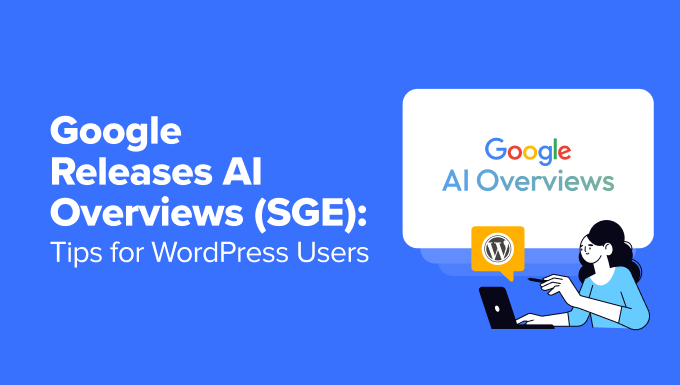
What Are Google AI Overviews (Formerly Google SGE)? How Are They Different From Regular Google Search?
When you enter a search query into Google or other search engines, you will typically be shown a list of relevant web pages that provide answers. Google continues to refine its search algorithm to make sure that the most helpful content is displayed at the top of the results.
For years now, Google has supplemented the list of web pages with additional information to help the user.
This includes Google answer boxes, featured snippets, Google knowledge panels, local business maps and profiles, and more. These display a summary of information on the business, product, or topic that users can read directly from the search results without needing to click a link.

The most recent additions to Google search results are AI overviews.
Google AI overviews use the Gemini generative AI model to create a helpful summary of the information the user is searching for. This is displayed at the top of the results page, and users can learn more by clicking on the links to individual web pages underneath.
In the screenshot below, you can see an AI overview of how long it takes to climb Mount Everest. The overview directly answers the query without the need for follow-up questions, and the key facts are highlighted along with links to the main sources.
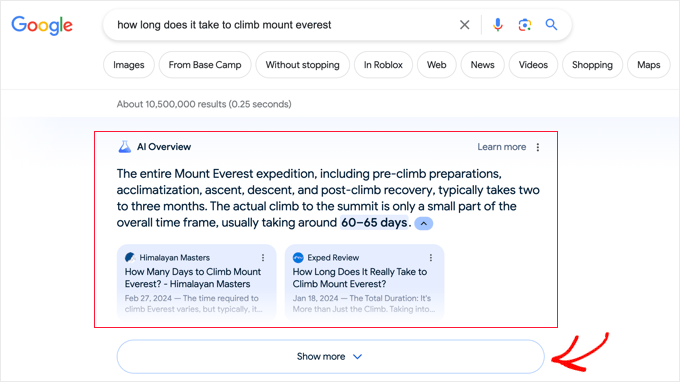
The AI creates these summaries by combining information from web pages, user-generated content on Reddit and other social sites, and Google’s own knowledge base.
A carousel of the web pages used to AI-generate the summary is displayed. These are relevant, credible web pages that match user intent.
Plus, clicking the ‘Show more’ button displays additional information within the overview.
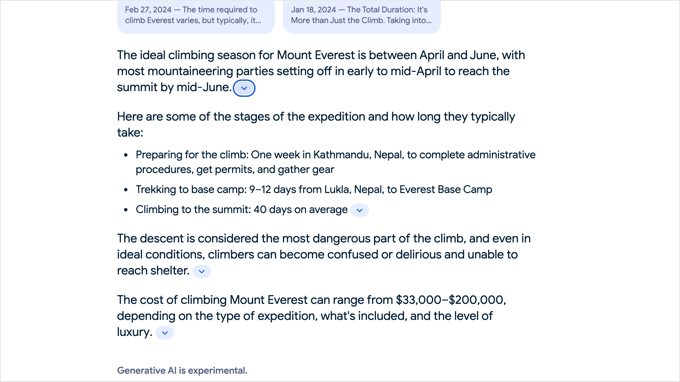
After this, you will find the regular Google search results, which are a list of relevant web pages where the user can learn more.
In the future, AI overviews will be extended to provide multi-step reasoning, step-by-step planning assistance such as recipes and trips, and visual search using videos and images. Users will also be able to adjust the language and level of detail.
When Can I Expect to See Google AI Overviews on Search Engine Results Pages?
Google AI overviews have been experimentally available for some time in Google Labs as Google SGE (Search Generative Experience). In May 2024, this feature started to be rolled out as the default search experience for users in the United States.
Google will gather feedback to improve the feature, and then roll it out to more countries. They aim to reach over a billion users by the end of 2024.
Tip: If you can’t currently see Google AI overviews on search results pages, then you may be able to enable it by visiting the Google Labs page when signed into your Google account. However, this feature is not available in all countries.
Will Google AI Overviews Hurt Your Rankings?
Google AI overviews will absolutely affect search. For most niches, an AI-generated overview will appear at the top of more than 80% of search results pages. However, some topics, such as finance, will display overviews less often.
This prominence of AI in search is likely to impact WordPress websites and blogs that rely on search for traffic. Search queries might also change as users use complex prompts to get more precise results from AI.
One concern from many website owners is that the traditional search results will be shifted down the search results page below the AI interface. Another is that users may find the information they need without needing to click on a link to your website.
Some people fear that this may result in less traffic going to websites. However, at this point, it is difficult to know what the full impact will be.
But it’s not all bad news. Google AI overviews will give small businesses a fresh opportunity to compete. Web pages featured in the overview are likely to see a boost in traffic. This makes it important to look for ways to leverage the AI overview as part of your overall SEO strategy.
We recommend that publishers and business owners continue focusing on writing high-quality, SEO-optimized content and using our tips below.
How to Prepare Your WordPress Website for Google AI Overviews
With Google AI overviews predicted to reach a billion users by the end of 2024, you may be wondering how to prepare your website and take advantage of the new opportunity.
Let’s take a look at our top tips on how to prepare your WordPress website for Google AI overviews. You can use the links below to navigate through the rest of the article:
1. Focus on Building Topical Authority
One of the best ways to improve and preserve your search rankings is to establish your website as an authority on a certain topic. Topical authority means your credibility and expertise on a specific niche or topic, such as SEO or web design.
Search engines like Google favor websites with topical authority, increasing your chances of ranking higher for relevant keywords. Building topical authority will also make it more likely for your web content to be used as a source for AI overviews.
Writing pillar articles on different topics can help you build your authority. These include comprehensive guides, in-depth articles, and posts that cover larger topics within your niche.
As you write more content, we recommend creating content clusters of more specific articles related to a topic. These should contain helpful information on relevant subtopics in greater depth.
You can then use internal linking to show the relationship between the posts. This will provide a guided journey for the user to learn everything they need to know about a specific topic and can show search engines like Google that you are a true authority on the subject.
For example, if your business is a web design agency, then you might have a pillar article generally covering the topic of web design that includes links to more detailed articles on specific design techniques and principles.
Free tools like the WPBeginner Keyword Generator can help you discover subtopics that you can add to your content clusters.

2. Demonstrate Thought Leadership and Personal Experiences
Many websites publish generic-sounding content, including purely AI-created articles. You can make your content stand out from the crowd by using your own voice and talking about your unique experiences.
When you express your own opinions and perspectives, you are more likely to engage with users who appreciate a personal touch and connect with your experiences. This can build trust and establish you as an authority figure in your niche.
Plus, this approach could help you attract readers who want to look beyond AI overviews and get advice directly from trusted sources.
That being said, that doesn’t mean you should avoid using any AI-generated content on your website. Just make sure to edit it to make sure it is readable and accurate. You should also add some of your own experiences for that valued human touch.
3. Optimize Your Content for E-E-A-T
Google prioritizes websites that can demonstrate expertise and experience in their posts. This is part of their ongoing effort to avoid promoting misinformation, especially on topics where the reader’s health, safety, happiness, or financial security are at risk.
Their E-E-A-T guidelines help website owners understand how to write posts that can be identified as helpful and authoritative. E-E-A-T stands for:
- Expertise, where a writer demonstrates a deep understanding of a topic, including any training or qualifications they have in the field.
- Experience, where content is based on first-hand encounters along with accurate and helpful personal insights.
- Authoritativeness, where a writer has a strong reputation for reliability among recognized experts in the field.
- Trustworthiness, based on unbiased and objective content that is transparent about its sources and funding.

Optimizing your content for these factors will help it rank and may help your website become featured in a Google AI overview.
To learn how to do this, just see our detailed guide on Google E-E-A-T for WordPress websites.
4. Make it Easy for Crawlers to Crawl Your Content
Since AI models still need to crawl your content in order for it to be indexed, it’s important to ensure that search engines can easily find and understand it. This is known as technical SEO.
Many SEO tools let you conduct SEO audits to learn whether your site is technically optimized. For example, AIOSEO Lite includes a free SEO Analysis tool that you can use to run a technical SEO audit right from your WordPress dashboard.

You might like to see our WordPress technical SEO framework, where we share a helpful checklist you can use for your business.
5. Write Your Content as Questions and Answers
Since Google AI overviews will typically answer questions, it makes sense to write your content as questions and answers. Mirroring how people search for information will increase the chances that your content aligns with the specific query an AI overview is trying to answer.
You can do this both by framing your article titles as questions and including questions and answers within the content itself.
The free WPBeginner Keyword Generator tool includes a helpful Questions section that lets you see the questions people are asking on Google about a certain keyword.
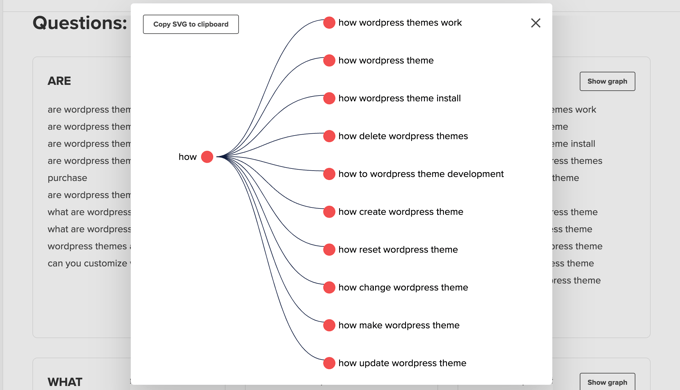
You can then compile a list of the most important questions and then create content that provides comprehensive answers.
You can also add FAQ (Frequently Asked Questions) sections to your articles.
The structured data markup used in FAQ schema helps Google understand your content more easily and may help your website become featured in the AI overview or ‘People also ask’ sections of the search results page.
6. Target Long-Tail Keywords and Queries
Keyword research is an important part of SEO. Keywords are the phrases that users type into Google when performing a search.
Long-tail keywords are more specific phrases that users search for once they have a better idea of what they need. Some examples are ‘the best noise canceling headphones for air travel’ and ‘the most valuable vintage Christmas ornaments’

When people type in very specific search queries, Google’s AI will look for web content from many different sources to answer these questions.
That means that if your content is targeting long-tail keywords, it is more likely to be picked up for these longer and less common queries. That being said, you will need to address the user’s question in detail within your content.
7. Focus on Your Brand’s Reputation
To ensure accuracy, Google’s AI will only use information from reputable sites when generating overviews. Focusing on your brand’s reputation can increase your chances of being featured in the Google AI overview link carousel.
One of the best ways to do this is link building. That’s because Google uses backlinks as a ranking signal. Whenever someone links to your website, it is seen as a recommendation that your content is helpful.
It’s also a good idea to focus on building positive customer reviews across platforms like Trustpilot, Google, and social media.
You can even add a customer reviews page to your WordPress website. This lets you showcase positive testimonials from satisfied customers and clients, strengthening your reputation.
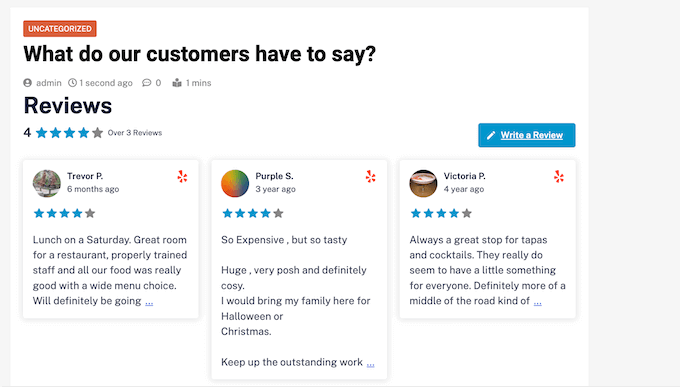
You should also engage with your users on social media. You can thank users who speak well of your business and reach out to people who have complaints to turn them into satisfied customers.
Google AI also seems to favor user-generated content from social platforms like Reddit. Users who regularly post helpful content on Reddit may find that information used in a Google AI overview.
We hope this tutorial helped you learn how to prepare your website for Google AI overviews. You may also want to see our guide on how to monitor Google algorithm updates in WordPress or our expert pick of the best WordPress SEO plugins and tools.
If you liked this article, then please subscribe to our YouTube Channel for WordPress video tutorials. You can also find us on Twitter and Facebook.
The post Google Releases AI Overviews (SGE): 7 Tips for WordPress Users first appeared on WPBeginner.
from WPBeginner https://ift.tt/Ob9lMnW
via IFTTT
No comments:
Post a Comment